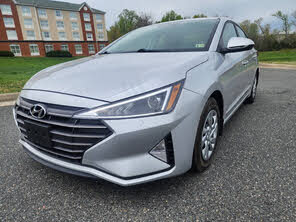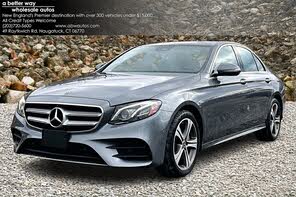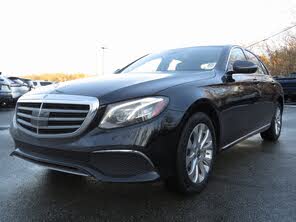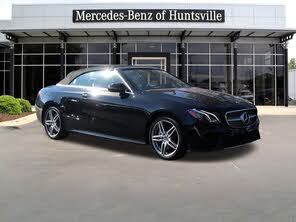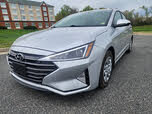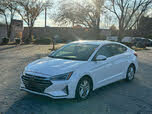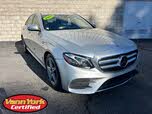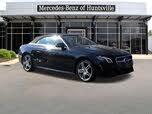2019 Hyundai Elantra vs 2020 Mercedes-Benz E-Class
Overview | |
MSRP$17,200 | MSRP$54,050 |
Listings758 | Listings261 |
Ratings & Reviews | |
User Reviews | User Reviews |
Expert reviews8.2 out of 10 | Expert reviews8.0 out of 10 |
Pros
Cons
| |
2019 Hyundai Elantra Reviews SummaryCustomer satisfaction is dependent on multiple factors. For example, let's say you go out to a new restaurant. Even if the service is great, or the bill is inexpensive, or the restaurant has a lovely ambiance, you probably won't go back if the food doesn't taste good. The updated and upgraded 2019 Hyundai Elantra is like that—unless you buy the turbocharged Sport trim. | |
2020 Mercedes-Benz E-Class Reviews SummaryA Mercedes-Benz is a physical indulgence that gives as much or as little pleasure as your checking account allows. The 2020 E-Class starts off well-equipped in ways a $55,000 Mercedes wasn't just a few years ago, and it becomes decadent and power-drunk once you start adding options. For 2020, a new base engine joins this car's stellar design, technology, and effortless demeanor. | |
Popular Features & Specs | |
Engine2.0L 147 hp I4 | Engine2.0L 255 hp I4 |
Drive TrainFWD | Drive TrainRWD |
Seating Capacity5 | Seating Capacity5 |
Horsepower147 hp @ 6200 rpm | Horsepower255 hp @ 5800 rpm |
MPG City26 | MPG City23 |
MPG Highway36 | MPG Highway32 |
Engine | |
Engine Name2.0L 147 hp I4 | Engine Name2.0L 255 hp I4 |
Torque132 lb-ft @ 4500 rpm | Torque273 lb-ft @ 1800 rpm |
Horsepower147 hp @ 6200 rpm | Horsepower255 hp @ 5800 rpm |
DrivetrainFWD | DrivetrainRWD |
Fuel Economy | |
MPG City26 | MPG City23 |
MPG Highway36 | MPG Highway32 |
Interior | |
Seating Capacity5 | Seating Capacity5 |
Key Features | |
Navigation System | Navigation SystemStandard |
Sunroof/Moonroof | Sunroof/MoonroofStandard |
Safety | |
Front Crash Overall4 | Front Crash Overall5 |
Side Crash Overall4 | Side Crash Overall5 |
Dimensions & Capacity | |
Cargo Space14.4 cu ft | Cargo Space13.1 cu ft |
Curb Weight2972 lbs | Curb Weight3814 lbs |
Height56.5 in | Height57.8 in |
Length181.9 in | Length193.8 in |
Width70.9 in | Width81.3 in |
Wheelbase106.3 in | Wheelbase115.7 in |
Number of doors4 | Number of doors4 |
Overview | ||
MSRP | $17,200 | $54,050 |
Listings | ||
Ratings & Reviews | ||
User reviews | ||
Expert reviews | 8.2 out of 10Read full review | 8.0 out of 10Read full review |
Pros & cons | Pros
Cons
| |
Summary | Customer satisfaction is dependent on multiple factors. For example, let's say you go out to a new restaurant. Even if the service is great, or the bill is inexpensive, or the restaurant has a lovely ambiance, you probably won't go back if the food doesn't taste good. The updated and upgraded 2019 Hyundai Elantra is like that—unless you buy the turbocharged Sport trim. | A Mercedes-Benz is a physical indulgence that gives as much or as little pleasure as your checking account allows. The 2020 E-Class starts off well-equipped in ways a $55,000 Mercedes wasn't just a few years ago, and it becomes decadent and power-drunk once you start adding options. For 2020, a new base engine joins this car's stellar design, technology, and effortless demeanor. |
Video | ||
Popular Features & Specs | ||
Engine | 2.0L 147 hp I4 | 2.0L 255 hp I4 |
Drive Train | FWD | RWD |
Seating Capacity | 5 | 5 |
Horsepower | 147 hp @ 6200 rpm | 255 hp @ 5800 rpm |
MPG City | 26 | 23 |
MPG Highway | 36 | 32 |
Engine | ||
Engine Name | 2.0L 147 hp I4 | 2.0L 255 hp I4 |
Torque | 132 lb-ft @ 4500 rpm | 273 lb-ft @ 1800 rpm |
Horsepower | 147 hp @ 6200 rpm | 255 hp @ 5800 rpm |
Drivetrain | FWD | RWD |
Fuel Economy | ||
MPG City | 26 | 23 |
MPG Highway | 36 | 32 |
Interior | ||
Seating Capacity | 5 | 5 |
Key Features | ||
Navigation System | Standard | |
Sunroof/Moonroof | Standard | |
Safety | ||
Front Crash Overall | 4 | 5 |
Side Crash Overall | 4 | 5 |
Dimensions & Capacity | ||
Cargo Space | 14.4 cu ft | 13.1 cu ft |
Curb Weight | 2972 lbs | 3814 lbs |
Height | 56.5 in | 57.8 in |
Length | 181.9 in | 193.8 in |
Width | 70.9 in | 81.3 in |
Wheelbase | 106.3 in | 115.7 in |
Number of doors | 4 | 4 |
The 2019 Hyundai Elantra, redesigned two years prior, featured a tailored look inspired by the Genesis G80 sedan. For 2019, it received new styling elements forward of the windshield and front doors, redesigned wheels, and a new trunk lid, taillights, and rear bumper. The design was described as kaleidoscopic, and some felt it was less appealing than the previous year's model. Inside, subtle changes improved the interior, with new air vents, a carbon-texture finish on some plastic housings, new gauges, and revised controls on the dashboard. The interior quality was high, with a robust and solid shifter, although some materials felt inexpensive. The Elantra was available in two models: the 5-door hatchback "GT" and the 4-door sedan in SE, SEL, Value Edition, Eco, and Limited trims. Prices for the sedan started at $17,100, plus $885 for the destination charge. The Limited trim, with the Ultimate Package, added advanced safety features and a navigation system, bringing the total cost to $26,690.
The 2020 Mercedes-Benz E-Class, new for 2017, featured a rounded, smooth body reminiscent of the E-Class from two generations ago. The design was streamlined, resembling the larger S-Class and smaller C-Class, making it recognizable within the Mercedes family. Available in sedan, wagon, coupe, or cabriolet, the E-Class catered to conservative buyers. The sedan looked especially rich with the hood ornament and thin-laced chrome grille, while most models had the sport grille with a large Mercedes emblem. LED lighting was delicate, and the proportions were visually appealing. The cabriolet's fluid form worked best, with a contrasting soft top revealing a sumptuous interior. The interior featured multi-tone leathers, aluminum, and deep-polished wood, with two feet of high-res digital screens stretching across the dash. The ambient lighting offered 64 colors, and the interior was designed for comfort and solitude. Even the base E-Class felt several cuts above other cars in its segment.


















The 2019 Hyundai Elantra, equipped with a 2.0-liter 4-cylinder engine producing 147 horsepower, relied on a 6-speed automatic transmission to power the front wheels. Acceleration was acceptable, with driving modes including Normal, Sport, and Smart. Sport mode made the Elantra feel livelier but added unwelcome weight to the steering. The EPA estimated 32 mpg in combined driving, and the car returned 29.3 mpg on a testing loop, with a trip computer reading 32.4 mpg after a week of driving. Handling was decent, with no significant praise or criticism for the steering and brakes. The ride quality could be busy due to the inexpensive torsion-beam rear-axle suspension. Overall, the Elantra was a nice car exuding quality and value, but its driving dynamics did not inspire desire.
The 2020 Mercedes-Benz E-Class E350 replaced the E300, featuring a turbocharged 2.0-liter 4-cylinder engine with 255 horsepower and 273 pound-feet of torque, paired with a 9-speed automatic transmission. The revised turbo and shorter intake runners provided quicker response. In Comfort mode, the E-Class was relaxed, while Sport and Sport+ modes kept the engine in its power band. The E450, with a 3.0-liter V6 producing 362 horsepower and 369 pound-feet of torque, offered effortless performance. The AMG E53, with a hybrid setup, produced 429 horsepower and 384 pound-feet of torque, while the AMG E63 S, with a 4.0-liter twin-turbo V8, delivered 603 horsepower and 627 pound-feet of torque. Fuel economy ranged from 19 to 23 mpg city and 26 to 32 highway, depending on the powertrain and body style. The E63 S showed 16/23 mpg in the lab.
The 2019 Hyundai Elantra offered good front-seat comfort for a compact car, with height-adjustable seats for both the driver and front passenger. Most trims included heated front seats, a leather-wrapped tilt-and-telescopic steering wheel, and dual-zone automatic climate control. Backseat comfort was less impressive, with hard plastic front seatbacks and no air conditioning vents or USB ports. Interior storage was decent, with a good-size center-console storage bin, a sizable glove box, and a tray forward of the shifter. The Limited trim included a wireless charging pad. The trunk offered 14.4 cubic feet of space, with a hands-free Smart Trunk release feature.
The 2020 Mercedes-Benz E-Class featured a complicated COMAND infotainment system on its huge screens, which were not touchscreens. The system required multiple steps for various functions, making it highly distracting. However, the E-Class felt functional with seat and seat climate controls on the door panels and plenty of space in every dimension. The coupe had a usable rear seat, and the wagon included a rear-facing jump seat for small children. The digital dash could be reconfigured, and the gauges were clear and high-res. The front passenger seat slid forward to make extra room when the rear seats folded down, and a net in the front passenger footwell was helpful for water bottles.
The 2019 Hyundai Elantra, except for the base SE, came with a 7-inch touchscreen infotainment system running Apple CarPlay, Android Auto, and satellite radio. The Limited trim included an Infinity premium sound system, and the Ultimate Package added an 8-inch display screen, navigation system, and SiriusXM Data Services. The infotainment system was easy to use, with the right number of knobs and buttons. The Limited's Infinity audio system delivered impressive sound quality, and the instrumentation glowed white at night, with secondary switchgear illuminating in blue. The Value Edition and Limited trims included a free 3-year trial subscription to Blue Link services, offering a long list of safety and convenience functions.
The 2020 Mercedes-Benz E-Class featured advanced tech, including a semi-automated driving system, V2X communication, and multi-contour seats. The Burmester stereo had surround-sound modes, and the front camera activated automatically when pulling up to a space. The Energizing Comfort Package adjusted climate settings and lighting to preset moods. The AMG models included a Track Pace app for race track guidance. The tech was overengineered with useful features and some novelties.
The 2019 Hyundai Elantra included important driver-assistance and collision-avoidance systems starting with the SEL trim, such as forward-collision warning, automatic emergency braking, lane-departure warning, lane-keeping assist, blind-spot monitoring, rear cross-traffic alert, and a driver-monitoring system. The Limited trim added adaptive cruise control, pedestrian detection, automatic high-beam headlights, and a Safe Exit system. The Elantra received top marks from the IIHS, except for an Acceptable rating for LATCH child-seat anchors. The NHTSA gave the car a 4-star overall rating, with 4-star frontal-impact and side-impact protection ratings for rear-seat occupants.
The 2020 Mercedes-Benz E-Class sedan and wagon scored a 5-star overall rating from the NHTSA and a Top Safety Pick+ rating from the IIHS. The coupe and cabriolet models were not tested but were considered equally safe. Innovations included Pre-Safe Sound, side bolster inflation during a side collision, and steering and brake adjustments for crosswinds. Standard safety features included forward emergency braking, a driver attention monitor, and blind-spot monitoring. Other driver-assist features were optional.
CarGurus highlights

According to CarGurus experts, the overall rating for the 2019 Hyundai Elantra is 8.2 out of 10, while the 2020 Mercedes-Benz E-Class scores 8.0 out of 10. Based on these ratings, the 2019 Hyundai Elantra is the recommended choice for its higher overall rating, offering a balance of quality, value, and essential features.
Choose the 2019 Hyundai Elantra if:
- You want a budget-friendly compact car with a starting price of $17,100.
- You value straightforward and easy-to-use infotainment and tech features.
- You seek a car with good safety ratings and essential driver-assistance systems.
Choose the 2020 Mercedes-Benz E-Class if:
- You desire a luxurious and versatile vehicle available in sedan, wagon, coupe, or cabriolet forms.
- You appreciate advanced tech features and semi-automated driving systems.
- You prioritize top safety ratings and innovative safety features.
CarGurus highlights

According to CarGurus experts, the overall rating for the 2019 Hyundai Elantra is 8.2 out of 10, while the 2020 Mercedes-Benz E-Class scores 8.0 out of 10. Based on these ratings, the 2019 Hyundai Elantra is the recommended choice for its higher overall rating, offering a balance of quality, value, and essential features.
Choose the 2019 Hyundai Elantra if:
Shop Now- You want a budget-friendly compact car with a starting price of $17,100.
- You value straightforward and easy-to-use infotainment and tech features.
- You seek a car with good safety ratings and essential driver-assistance systems.
Choose the 2020 Mercedes-Benz E-Class if:
Shop Now- You desire a luxurious and versatile vehicle available in sedan, wagon, coupe, or cabriolet forms.
- You appreciate advanced tech features and semi-automated driving systems.
- You prioritize top safety ratings and innovative safety features.

By: CarGurus + AI
At CarGurus, our team of experienced automotive writers remain at the heart of our content operation, conducting hands-on car tests and writing insightful guides that are backed by years of industry experience. To complement this, we are harnessing AI to make our content offering more diverse and more helpful to shoppers than ever. To achieve this, our AI systems are based exclusively on CarGurus content, ratings and data, so that what we produce is both unique to CarGurus, and uniquely helpful to car shoppers.



